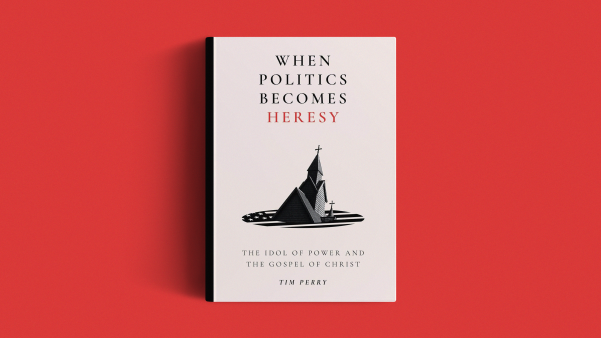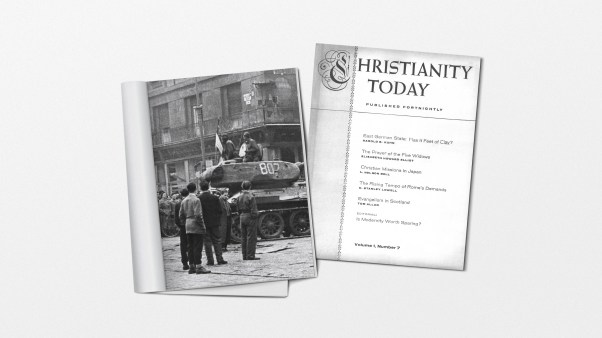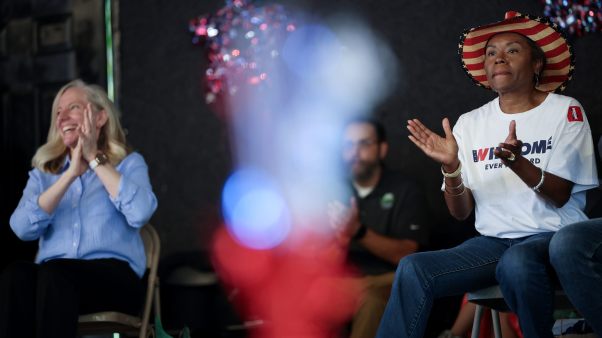There’s a story about a small band of 19th-century pioneers crossing the Mojave Desert to earn their fortune in the promised land of California. Unprepared for the Mojave’s harsh, arid climate and deceived by length of a desert mile, they died of acute dehydration. The tragedy of their story is not just that they died, but that their death was needless as well: just three feet below the surface of the Mojave’s cracked and dry ground were springs of fresh water. The pioneers were, quite literally, standing on a reservoir yet dying of thirst.
In his heatedly contested debut documentary, Monumental, Kirk Cameron makes a similar claim about the situation facing 21st-century America. With a government debt nearing $16 trillion and a culture that values entertainment over education, innovation over tradition, and individual preferences over moral law and virtue, it’s safe to say that we live in a theological and moral desert. In Monumental, Cameron, an outspoken evangelical Christian, argues that like that group of pioneers, Americans today are standing on a reservoir and dying of thirst.
And the springs of life for our cultural desert are the wisdom of our country’s forefathers.
Cameron’s documentary, which debuted in theaters two weeks ago, is his sincere quest to unpack how our forefathers, the Pilgrims, might help us get back on track. The Pilgrims were a tiny group of religious outcasts traveling to America in 1620 to escape religious persecution in England while still maintaining their cultural identity. Cameron traces the steps of the Pilgrims to discover the source of the principles that were used to establish the American government. “What principles did they use to ultimately wind up with a nation that has received more blessing, security, and prosperity than any nation in the history of the world?”
Cameron concludes that the strategy employed by the pilgrims—then followed by the Founding Fathers—is commemorated in the National Monument to Our Forefathers, a statue located in Plymouth, Massachusetts. On the main pedestal, a figure named “Faith” points towards heaven while clutching the Bible. Faith is buttressed by four figures that exemplify the four principles upon which the Pilgrims established their commonwealth: freedom, morality, law, and education.
According to Dr. Marshall Foster, president of the World History Institute, this “matrix of liberty” shows us how to regain liberty should we ever lose it. Foster states, “[It’s] the only successful strategy of liberty that has been carried out in the history of mankind … this strategy is what built America.”
I’ll admit that I approached Monumental with more than a little skepticism; I’m wary of a reductionism that tries to explain massive tides of human history in terms of a single movement or cause. Before seeing it, I worried that the film would diminish history by failing to take into account the full story of the “American experiment.”
As expected, by focusing exclusively on the Pilgrims, the film didn’t even mention the rich diversity of people that came to America—the landed British gentry, the convicts and debtors in Georgia, the African slaves, the poor of Europe, among others. America is, and always has been, a cultural smorgasbord of competing voices and values.
Second, Cameron could have shored up the integrity of the film by consulting experts with more training in history. The “experts” called on in this film may be perfectly legitimate voices in their respective areas of focus, but their expertise in history is dubious and weakens the film’s credibility, even if the movie’s overall message is provocative and convincing at points.
But the most glaring omission of Monumental was the failure to distinguish the motivation of the Founding Fathers for following the strategy outlined by the Pilgrims—not because they believed it but because it was useful. They distributed Bibles and endorsed the teaching of religion in school because they understood that morality “was necessary to good government and the happiness of mankind” and they doubted peoples’ ability to achieve morality apart from religion. As George Washington wrote, “And let us with caution indulge the supposition that morality can be maintained without religion … Reason and experience both forbid us to expect that national morality can prevail to the exclusion of religious principle.”
But while the film is not exactly right, it’s not exactly wrong. Many philosophers and political thinkers have understood that a democracy that loses its religious moorings will also lose its way. In his magnificent analysis of American democracy, for example, Alexis de Tocqueville said that democracies cause tendencies towards selfish individualism, consumerism, materialism, and equality at the expense of liberty—the very kinds of tendencies that religious beliefs guard against. “The reign of liberty,” he wrote, “cannot be established without morality, nor morality without beliefs.” A democracy is governed by the will of the people, and when objective morality or virtue gives way to subjective values, a society will fail to develop people with the character needed to rule a government with wisdom.
I wish that Cameron had relied on experts with more relevant training so that these issues might have been addressed with deeper clarity. But to his credit, Cameron isn’t sticking his head in the sand and waiting for the Rapture, unlike others from his particular slice of Christendom. “Everybody’s telling me the world’s going to hell,” he says in the film. “To top it off, I have friends in church that tell me that the worse things get, the better it really is, because it means the end is near. Don’t worry that it’s going to hell … the whole thing is going to burn. Really? Because I have kids in this world and I want a great future for them.”
Cameron’s sincerity and affability make it hard for me to completely ignore his concerns. Besides, his core argument is hard to dispute: America is in trouble, and it’s going to be a “monumental” task to set things right.








